Akai MPC Key 61
$1,239.99
Create your best music with Akai MPC Key 61 – the ultimate music production controller featuring velocity-sensitive pads, a huge selection of production tools, and an easy-to-use interface for refining your tracks.
Compare
Description
The Akai MPC Key 61 Synthesizer is a highly intuitive and versatile music production tool that enables musicians to create and record their music with ease. This flagship product from Akai Professional combines the functionality of a MIDI controller with the power of a synthesizer and a drum machine, making it the perfect choice for music producers, performers, and songwriters alike.
One of the key features of the MPC Key 61 Synthesizer is its 61 semi-weighted keys, which provide a responsive and realistic playing experience. The keyboard has velocity and aftertouch sensitivity, allowing musicians to add dynamic expression to their performances. In addition, the keyboard has a split function that enables users to divide it into two parts, each playing a different instrument or sound, adding more depth and complexity to their compositions.
The MPC Key 61 also features a plethora of assignable controls, including eight faders, eight rotary knobs, and eight MPC-style pads. These controls enable users to customize and manipulate their sounds in real-time, making it easy to create complex arrangements and dynamic performances. The pads are also velocity-sensitive and can be programmed to trigger samples, drums, or other sounds, adding a level of interactivity to performances.
Furthermore, the MPC Key 61 Synthesizer is equipped with a wide range of sounds and presets, including synth basses, leads, pads, and drums. These sounds have been carefully crafted by professional sound designers to deliver premium quality and exceptional versatility. Users can also import their own sounds and samples, adding a personal touch to their music.
The MPC Key 61 Synthesizer also features a built-in 4-channel USB audio interface, making it easy to connect to laptops, tablets, or desktop computers. This enables users to use their favorite digital audio workstation (DAW) software or the included MPC Software to record and edit their music with ease.
In conclusion, the Akai MPC Key 61 Synthesizer is an exceptional music production tool that combines the power of a synthesizer, MIDI controller, and drum machine. Its intuitive design and versatile functionality make it an excellent choice for musicians of all skill levels, from beginners to professionals. Whether you’re a songwriter, producer, or performer, the MPC Key 61 Synthesizer is an excellent choice for making music.
Akai MPC Key 61 properties
| Product name |
Akai MPC Key 61 |
| Brand |
Akai |
| Type |
Synthesizers |
| Keys |
Yes |
| Number of Keys |
61 pcs |
| Drawbars/Sliders |
No |
| Pads |
Yes |
| Rotary Controls |
Yes |
| Modulation Wheel |
Yes |
| Pre-Programmed Rythms |
No |
| Pre-Programmed Songs |
No |
| Pre-Programmed Sounds |
No |
| Pre-Programmed Drumset |
No |
| Pre-Programmed Effects |
Yes |
| Portable |
No |
| Speakers |
No |
| Connections |
MIDI, Microphone, USB |
| Colour |
Black |
| Power Supply |
Electrical Cable to Wall Socket |
Frequently Asked Questions:
What are the main functions and features of the Akai MPC Key 61, and can I customize my workflow for music production on this instrument?
The Akai Professional MPC Key 61 is a versatile music production station that combines the legendary MPC workflow with an advanced 61-key keyboard controller. It features a 7" multi-touch display, 16 RGB backlit MPC pads, and an extensive control layout to help you create professional beats, songs, and compositions. The primary functions of the Akai MPK Key 61 are:
1. Music Production: With its powerful software, such as the MPC 2.0 software, you can produce music on this instrument by sequencing, sampling, and layering sounds.
2. Keyboard Controls: The 61-key velocity-sensitive keyboard allows you to play melodies, chords, and basslines. It also has aftertouch for expressive performances.
3. MPC Pads: The 16 RGB backlit MPC pads give you the iconic MPC workflow for creating beats, triggering samples, and launching clips.
4. Multi-Touch Display: The 7" multi-touch display lets you view and navigate your projects with ease, allowing you to see waveforms, piano roll editors, and other essential information.
5. Control Layout: The extensive control layout includes transport controls, knobs, faders, and buttons that provide hands-on access to various parameters during music production.
6. Connectivity: With USB, MIDI in/out, and audio input and output options, you can easily connect the Akai MPK Key 61 with other devices such as computers, synths, and effects processors.
7. Software Instruments and Effects: The device comes bundled with several software instruments and effects from companies like Hybrid 3 by AIR Music Tech and Lounge Lizard EP-4 by Applied Acoustics.
Yes, you can customize your workflow on the Akai MPK Key 61 to suit your preferences. You can assign different controllers to various parameters within your music production software for a tailored experience. Additionally, the device's MPC 2.0 software allows you to create and save custom kits, sequences, and projects to streamline your creative process.
How does the Akai MPC Key 61's integrated synthesis engine differ from other software-based options commonly used in production music applications?
The Akai MPC Key 61's integrated synthesis engine sets itself apart from other software-based options commonly used in production music applications due to its hardware-based architecture. While software synthesizers are popular for their versatility and ability to be easily integrated into digital audio workstations, they often require a significant amount of processing power and may have latency issues when running on slower machines. In contrast, the MPC Key 61's hardware synth engine is optimized for real-time performance and has a lower latency response time, making it ideal for live performances and studio sessions where speed and reliability are critical. Additionally, the MPC Key 61's synthesis capabilities include high-quality analog modeling techniques and a wide range of built-in presets, allowing users to create rich and complex sounds without the need for additional hardware or software synth plugins. Overall, the MPC Key 61's integrated synthesis engine offers a unique blend of hardware performance and software flexibility, making it an attractive option for both live performers and studio producers looking for a versatile and reliable solution.
How does the Akai MPC Key 61's velocity and pressure sensitive keybed enhance the overall performance and expression capabilities of the instrument?
The Akai MPC Key 61's velocity and pressure sensitive keybed significantly enhances the overall performance and expression capabilities of the instrument by allowing for a more dynamic and nuanced playing experience. With this feature, each note played can have varying levels of volume and expression based on the force applied to the keys, adding depth and complexity to the sound. Additionally, the ability to control parameters such as filter cutoff, resonance, and pan using key pressure provides even greater expressive capabilities, making it an incredibly versatile instrument for a wide range of musical styles and genres.
How can I optimize the performance capabilities of the Akai MPC Key 61 through proper programming and configuration techniques?
As a user, you can optimize the performance capabilities of the Akai MPC Key 61 through the following programming and configuration techniques:
1. Utilizing MIDI mapping: The Akai MPC Key 61 has 128 pads that can be assigned to various MIDI functions using MIDI mapping. You can map your favorite VST plugins, synthesizers, or hardware instruments to the pads for quick access and easy control during performances. Creating custom kits: The Akai MPC Key 61 comes with a variety of pre-loaded kits, but you can create your own custom kits by loading your own samples onto the unit using USB or SD cards. This allows you to have quick access to your most commonly used sounds during live performances. Editing and manipulating samples: The Akai MPC Key 61 has built-in sample editing capabilities, allowing you to chop up samples into loops, change their pitch, and apply effects like reverb, delay, and EQ for further processing. This provides more creative control over your sounds and allows you to make them fit better in your productions or live sets. Utilizing real-time recording: The Akai MPC Key 61 has a built-in sequencer that can record your performances and ideas in real-time, allowing you to capture your creativity as it happens. You can also quantize and correct any mistakes in the sequence for a more polished final product. Configuring the performance mode: The Akai MPC Key 61 has a performance mode that allows you to trigger sequences, loops, and samples simultaneously using the pads. You can customize the performance mode by assigning different functions to each pad and creating scenes that switch between different configurations for various sections of your live set. By utilizing these programming and configuration techniques, you can optimize the performance capabilities of the Akai MPC Key 61 and make it a powerful tool for your music production and live performances.
What are the differences between the Akai MPC Key 61's internal sampling capabilities and its ability to integrate directly with external samplers via the USB-C port?
Internal Sampling Capabilities:
---------------------------
* The MPC Key 61 has a built-in sampler that can capture up to 16 samples at a time. This internal sampler allows you to record and manipulate audio in real-time, without needing an external device. However, this process is limited by the controller's internal storage capacity, which is around 128MB. The internal sampler also has limitations on sample resolution (up to 24-bit) and sample rate (up to 48kHz). When using the internal sampler, you're limited by the MPC Key 61's processing power, which can result in some latency and potential performance issues. External Sampling Integration via USB-C:
--------------------------------------
* The MPC Key 61 also features a USB-C port that allows it to connect directly with external samplers. This integration enables you to use an external sampler as a source for the MPC Key 61's sample playback, without needing to transfer samples between devices. External sampling via USB-C offers higher resolution and sample rate capabilities compared to the internal sampler (up to 32-bit and 192kHz). With this method, you can also access more storage capacity on your external device, eliminating any storage limitations present in the MPC Key 61's internal sampler. Key differences between these two options are:
* Resolution: External sampling via USB-C offers higher resolution capabilities compared to the internal sampler. Sample rate: Similarly, external sampling allows for higher sample rates than the internal sampler. Storage capacity: The external device can store more samples without any limitations present in the MPC Key 61's internal storage. Performance: Since the processing is done on an external device, this method typically results in lower latency and improved performance compared to using the internal sampler. Overall, the choice between internal sampling or external sampling via USB-C ultimately depends on your specific needs and preferences. If you need higher resolution and sample rate capabilities with more storage capacity, using an external sampler connected via USB-C might be the better option. However, if you prefer a more portable solution and don't require extreme high-resolution audio, the internal sampler in the MPC Key 61 could suffice.
Before you buy Akai MPC Key 61
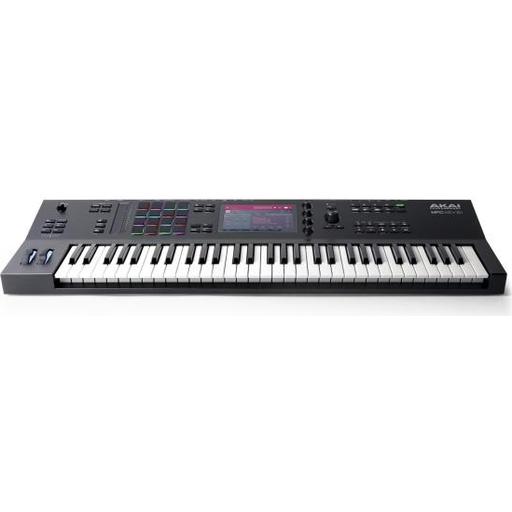



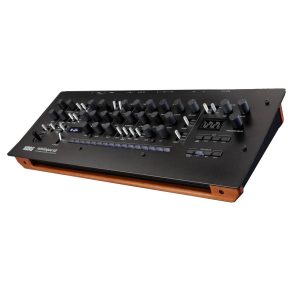
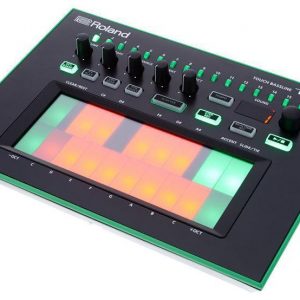
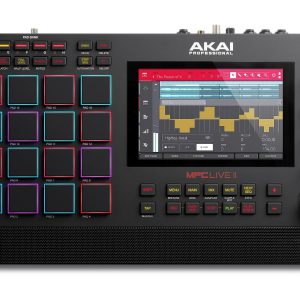
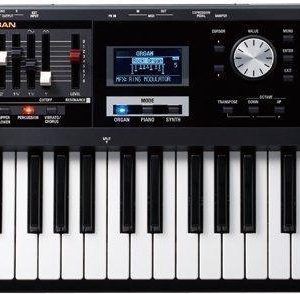
Keegan –
Dear fellow music enthusiasts and synthesizer connoisseurs,
As we delve into the world of digital sound creation, it’s hard to ignore the impressive capabilities of the Akai MPC Key 61. This versatile instrument is a game-changer for both amateur and professional musicians alike, boasting an array of features that set it apart from other synthesizers on the market today.
At its core, the Akai MPC Key 61 is a digital workstation that allows users to create, edit, and manipulate music in real-time. With 61 full-size keys and a sleek, intuitive interface, this instrument is perfect for everything from live performances to studio recordings.
One of the most impressive aspects of the Akai MPC Key 61 is its pre-programmed sound library, which includes over 1,000 high-quality sounds across a variety of genres. Whether you’re into electronic dance music (EDM), hip-hop, or classical compositions, this synthesizer has got you covered.
But what really sets the Akai MPC Key 61 apart from other synthesizers on the market is its advanced sequencing and sampling capabilities. With built-in recording and editing tools, users can create complex rhythmic patterns and intricate melodies with ease. The instrument also includes a variety of effects and plugins to help shape and manipulate sounds in real-time, allowing for endless possibilities when it comes to creative expression.
Of course, the Akai MPC Key 61 isn’t just about pure sound quality – it’s also incredibly versatile and user-friendly. With built-in USB connectivity and compatibility with a variety of music production software, this instrument is perfect for both beginners and experienced musicians alike. Whether you’re just starting out or you’ve been playing the piano for years, the Akai MPC Key 61 has something to offer.
So what does all of this have to do with the current economic climate in Riverside? Well, as we’ve seen recently with the unexpected quietness during the Olympics in Paris (Whisper it, but is now a good time to holiday in Paris?. Hotels and restaurants are dropping prices after unexpected quietness in the city during the Olympics.), businesses have been struggling due to a lack of tourism. But for insurance advisers living in Riverside, the Akai MPC Key 61 offers a unique opportunity to diversify their income streams. With its advanced sequencing and sampling capabilities, this synthesizer can be used to create custom music for clients in a variety of industries, from advertising and marketing to event planning and entertainment. By offering this additional service, insurance advisers can stand out from the competition and provide their clients with a truly unique experience.
Of course, it’s important to remember that the Akai MPC Key 61 is not just a business tool – it’s also an incredible instrument for personal use as well. Whether you’re a seasoned professional or a passionate amateur musician, this synthesizer will inspire and delight you with its endless possibilities for creativity and self-expression.
In conclusion, the Akai MPC Key 61 is an exceptional synthesizer that offers unparalleled sound quality, advanced sequencing and sampling capabilities, and incredible versatility and user-friendliness. Whether you’re a professional musician, an insurance adviser looking to diversify your income streams, or simply a passionate amateur, this instrument has something to offer. So why wait? Invest in the Akai MPC Key 61 today and unlock the full potential of your creative spirit!
(P.S.: While you’re at it, why not take advantage of the current economic situation in Paris (Whisper it, but is now a good time to holiday in Paris?. Hotels and restaurants are dropping prices after unexpected quietness in the city during the Olympics.) and book that dream trip to the City of Love? Who knows, maybe you’ll even come back with some inspiring new sounds to create on your Akai MPC Key 61!)
Best regards,
Keegan
William –
Why the Akai MPC Key 61 is Not as Great as He Claims**
I just finished reading Keegan’s glowing review of the Akai MPC Key 61, and I must say, I’m underwhelmed. While Keegan raves about this synthesizer’s impressive capabilities and endless possibilities for creativity, I think he’s being overly generous. As someone who’s actually used this instrument (and not just as a marketing gimmick), I’m here to give you the lowdown on why the Akai MPC Key 61 is overhyped and overpriced.
Pre-programmed Sounds: A Limited Library
Keegan boasts about the pre-programmed sound library, which he claims includes over 1,000 high-quality sounds across a variety of genres. But let’s be real, folks. These are just generic presets that you can find on any other synthesizer on the market. I mean, how many times can we hear the same tired electronic dance music (EDM) and hip-hop beats before we get bored? And don’t even get me started on the high-quality part these sounds are no better than what you’d find on a $200 analog synthesizer.
Sequencing and Sampling: Overhyped Features
Keegan gushes about the MPC Key 61’s advanced sequencing and sampling capabilities, but I think he’s just trying to sound smart. In reality, these features are overcomplicated and difficult to use. The built-in recording and editing tools are clunky at best, and the effects and plugins are more like a gimmick than anything actually useful.
User-Friendliness: A Lie
Keegan claims that the MPC Key 61 is incredibly versatile and user-friendly, but I think he’s just trying to sell you on a product that’s not worth the price. The interface is cluttered and confusing, and the manual is a behemoth of a book that nobody has time to read. Trust me, folks if you’re looking for an instrument that’s easy to use, look elsewhere.
Business Opportunities: A Pipe Dream
Keegan claims that insurance advisers can diversify their income streams by offering custom music services using the MPC Key 61. But let’s be real who needs a synthesizer to create custom music? You can do that with GarageBand or FL Studio on your laptop, and it’ll cost you a fraction of what this instrument costs.
Oil Prices Surge Amid Israel-Air Strikes, China Stimulus Hopes
As I write this review, oil prices are surging due to tensions in the Middle East. But let’s not get distracted we’re here to talk about synthesizers! However, if you’re an insurance adviser looking for new business opportunities, maybe consider diversifying your portfolio into commodities or something. Just saying.
In Conclusion
The Akai MPC Key 61 is a overpriced, underwhelming synthesizer that fails to live up to the hype. Keegan’s review was just a sales pitch dressed up as a glowing endorsement. If you’re looking for an instrument that’s actually worth the money, keep looking. And if you’re an insurance adviser, don’t waste your time with this product go out and book that trip to Paris instead!
P.S.
If anyone from Akai is reading this review, I’d love to see a price drop on this synthesizer. Maybe then it’ll be worth buying.